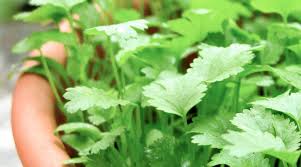If You Don’t Like Cilantro This May Be The Reason Why

I have to say I am a cilantro lover. I absolutely love the taste of cilantro, but I know some people hate the smell and taste of cilantro as much as I love it. Dr. Greger has uncovered some data that may explain why people are so polarized and divided as to either their absolute love or hate of the smell and taste of cilantro.
Studies have shown that people love or hate cilantro because they experience the taste differently. I am part of the group that thinks cilantro is fresh, fragrant and citrusy. The other group thinks cilantro smells and tastes like soap, mold, dirt, or bugs.[1]
A study has indicated that this polarization and divisiveness may be due to genetics.
“We find a nucleotide polymorphism (SNP) significantly associated with with soap-taste detection that is confirmed in the cilantro preference group.” A gene called “OR6A2 appears to be the most promising candidate underlying the association with cilantro odor detection”[1]
The gene allows us to smell a chemical called (E)-2-decenal that makes up 46% percent of cilantro, and that is part of the defensive secretions of stink bugs. Cilantro lovers may have a genetic inability to smell the unpleasant compounds in cilantro, which is actually a good thing because cilantro is a healthy plant-based food.
Cilantro has been used in traditional medicine because of its tremendous medicinal properties and now western medicine is catching up to its understanding.
“Due to the presence of a multitude of bioactives, a wide array of pharmacological activities have been ascribed to different parts of the herb, which include anti-microbial, anti-oxidant, anti-diabetic, anxiolytic, anti-epileptic, anti-depressant, anti-mutagenic, anti-inflammatory, anti-dyslipidemic, anit-hypertensive, neuro-protective, and diuretic. Intersetingly, corriander (cilantro) possessed lead-detoxifying potential.”[2]
[1] L Mauer, A El-Sohemy. Prevalence of cilantro (Coriandrum sativum) disliking among different ethnocultural groups. Flavour 2012, 1:8.
[2] N G Sahib, F Anwar, A H Gilani, A A Hamid, N Saari, K M Alkharfy. Coriander (Coriandrum sativum L.): a potential source of high-value components for functional foods and nutraceuticals–a review. Phytother Res. 2013 Oct;27(10):1439-56.






